Wikipedia:Picture of the day/May 2022
|
Featured picture tools: |
These featured pictures, as scheduled below, appeared as the picture of the day (POTD) on the English Wikipedia's Main Page in May 2022. Individual sections for each day on this page can be linked to with the day number as the anchor name (e.g. [[Wikipedia:Picture of the day/May 2022#1]] for May 1).
You can add an automatically updating POTD template to your user page using {{Pic of the day}} (version with blurb) or {{POTD}} (version without blurb). For instructions on how to make custom POTD layouts, see Wikipedia:Picture of the day.
May 1

|
Naser al-Din Shah Qajar (16 July 1831 – 1 May 1896), was the Shah of Qajar Iran from 5 September 1848 to 1 May 1896 when he was assassinated. He was the son of Mohammad Shah Qajar and Malek Jahān Khānom and the third longest reigning monarch in Iranian history after Shapur II of the Sassanid dynasty and Tahmasp I of the Safavid dynasty. He was the first modern Persian monarch who formally visited Europe and also wrote his memoirs. Photograph credit: Nadar; restored by Adam Cuerden
Recently featured: |
May 2

|
A talismanic shirt is an item of clothing worn as a talisman. Talismanic shirts are found throughout the Islamic world, and can be grouped into four general types that differ in style and the symbols used: Ottoman, Safavid, Mughal, and West African. Such shirts were believed to be capable of offering protection to the wearer, especially in battle. This 17th-century Turkish talismanic shirt is made of cotton and inscribed with Quranic verses, the names of Allah, Islamic prayers, and views of Mecca and Medina in ink and gold. The shirt forms part of the Khalili Collection of Hajj and the Arts of Pilgrimage. Textile credit: unknown; photographed by the Khalili Collection of Hajj and the Arts of Pilgrimage
Recently featured: |
May 3
|
Whale vocalizations are the sounds used by whales for different kinds of communication. Sounds are produced by cetaceans for various purposes by several different mechanisms. Toothed whales produce rapid bursts of high-frequency clicks that are thought to be primarily for echolocation, while the complex sounds of the humpback whale (and some blue whales) are believed to be primarily used in sexual selection. This young humpback whale is singing in the waters of Vavaʻu, Tonga. Credit: Sylke Rohrlach
Recently featured: |
May 4
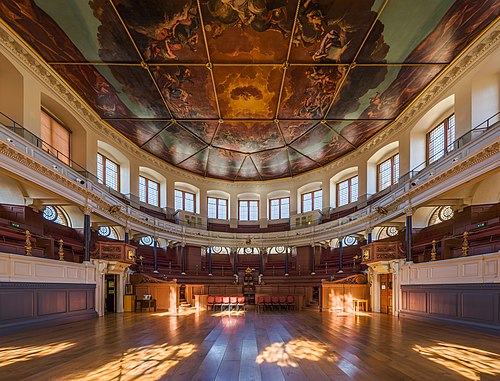
|
|
The Sheldonian Theatre is a theatre in Oxford, England, designed by Christopher Wren and built from 1664 to 1669 for the University of Oxford. Used for music concerts, lectures and university ceremonies, the building is named after Gilbert Sheldon, Archbishop of Canterbury, the chancellor of the university at the time, and the project's main financial backer. According to Wren's son, the design was inspired by Sebastiano Serlio's 16th-century engraving of the D-shaped Theatre of Marcellus erected in Rome in the 1st century BC. The ceiling, partly depicted in this photograph of the theatre's interior, consists of thirty-two oil-on-canvas panels originally painted by Robert Streater, King Charles II's court painter, and depicts an allegory of Truth descending upon the Arts and Sciences and expelling ignorance from the university. Photograph credit: David Iliff
Recently featured: |
May 5

|
The eastern chanting goshawk (Melierax poliopterus) is a species of bird of prey in the family Accipitridae endemic to eastern Africa. This species averages 49 to 55 cm (19 to 22 in) long, with a wingspan of 96 to 110 cm (38 to 43 in) and a tail length of 20 to 25 cm (7.9 to 9.8 in). Males average 85 percent the size of females. This eastern chanting goshawk was photographed in Awash National Park, Ethiopia. Photograph credit: Charles James Sharp
Recently featured: |
May 6

|
Einat Kalisch-Rotem (born 1970) is an Israeli urban planner who has served as the mayor of Haifa since November 2018. She unseated the incumbent Yona Yahav in the 2018 mayoral election, becoming the first woman to lead any of Israel's three major cities. Besides her public career, Kalisch-Rotem has a black belt in karate. Photograph credit: Edward Kaprov
Recently featured: |
May 7

|
The Indian tent turtle (Pangshura tentoria) is a species of turtle in the family Geoemydidae, endemic to India and Bangladesh. The species's carapace grows to a maximum length of 27 centimetres (11 inches). This turtle of the subspecies P. t. tentoria was photographed beside the Chambal River in the Indian state of Uttar Pradesh. Photograph credit: Charles J. Sharp
Recently featured: |
May 8
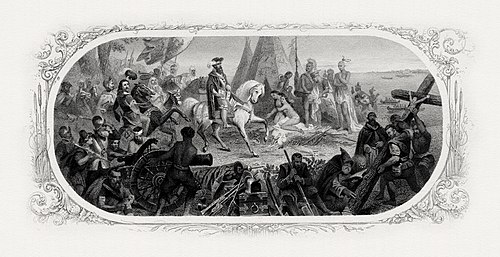
|
|
Hernando de Soto (c. 1500 – 1542) was a Spanish explorer and conquistador who was involved in expeditions in Nicaragua and the Yucatán Peninsula. He played an important role in Francisco Pizarro's conquest of the Inca Empire in present-day Peru, but is best known for leading the first European expedition deep into the territory of the modern-day United States. He was the first European documented as having crossed the Mississippi River, which he did on May 8, 1541, depicted in this engraved vignette, an example of art on United States banknotes. Produced for the Department of the Treasury's Bureau of Engraving and Printing, the engraving is of William Henry Powell's painting Discovery of the Mississippi by De Soto, which hangs in the Capitol rotunda in Washington, D.C. Engraving credit: Frederick Girsch, after William Henry Powell; restored by Andrew Shiva
Recently featured: |
May 9

|
|
A map of Europe in the year 1923, showing political boundaries. The post–World War I treaties (1919–1921) and Revolutions of 1917–1923 had created many new states, including the Russian Soviet Federative Socialist Republic, Irish Free State, Estonia, Finland, Latvia, Lithuania, a German Republic, an Austrian Republic, Czechoslovakia, the Kingdom of Serbs, Croats and Slovenes, and Poland. Map credit: George Washington Bacon
Recently featured: |
May 10

|
Misumena vatia, the flower spider, is a species of crab spider found in North America and Europe. Females choose to settle on a flower where they remain stationary, while the much smaller males roam around looking for mates. This female spider was photographed having caught a silver-spotted skipper on a Centaurea jacea flower in Bükk National Park, Hungary. Photograph credit: Charles J. Sharp
Recently featured: |
May 11

|
Hattie Wyatt Caraway (1878–1950) was an American politician who became the first woman elected to serve a full term as a United States senator, representing the state of Arkansas from 1931 to 1945. This photograph was taken in 1914, when her husband was a member of the United States House of Representatives. Although she took an interest in her husband's political career at the time, Caraway avoided the capital's social and political life as well as the campaign for women's suffrage, recalling: "After equal suffrage I just added voting to cooking and sewing and other household duties." Photograph credit: Harris & Ewing; restored by Adam Cuerden
Recently featured: |
May 12

|
The sequin (zecchino) is a gold coin minted by the Republic of Venice. The design of the coin remained relatively unchanged for more than 500 years, from its introduction in 1284 to the fall of the Venetian Republic at the hands of Napoleon on 12 May 1797. No other coin design has ever been produced over such a long historical period. This coin, with a face value of 50 zecchini, was minted between 1779 and 1789, during the reign of Paolo Renier, the 119th and penultimate doge of Venice. The coin has a diameter of 76 millimetres (3.0 in) and weighs 192.5 grams (6.79 oz), and forms part of the National Numismatic Collection at the Smithsonian Institution. Credit: Zecca of Venice; photographed by Andrew Shiva
Recently featured: |
May 13

|
The variable oystercatcher (Haematopus unicolor) is a species of wader in the family Haematopodidae, endemic to New Zealand. The plumage ranges from pied through mottled to all black in different parts of the bird's range. They search for food in shallow water as the tides ebb and flow. Food is mainly located visually but when it is dark or the food is obscured, they will probe the substrate with their bill. The diet consists of a range of molluscs, crustaceans, worms and sometimes small fish. This bird was photographed at Point Chevalier in Auckland, New Zealand. Photograph credit: John Harrison
Recently featured: |
May 14

|
|
The Hunting of the Snark is a nonsense poem by the English writer Lewis Carroll, telling the story of ten characters who cross the ocean to hunt a mysterious creature known as the Snark. The poem was published in 1876 with illustrations by Henry Holiday. This is the eighth plate from Holiday's illustrations, accompanying "Fit the Sixth: The Barrister's Dream". The Barrister, one of the crew members, sleeps and dreams of witnessing the trial of a pig accused of deserting its sty. The Snark is depicted in the foreground, acting as the defence barrister and dressed in robe and wig – the nearest to an illustration of the creature in the set. The Barrister is ultimately woken by the Bellman's bell ringing in his ear, as seen in the bottom left. Illustration credit: Henry Holiday; restored by Adam Cuerden
Recently featured: |
May 15

|
Élie Metchnikoff (15 May 1845 – 15 July 1916) was a Russian and French zoologist of Romanian noble ancestry and Ukrainian Jewish origin, best known for his pioneering research on immunology, for which he was jointly awarded the 1908 Nobel Prize in Physiology or Medicine with Paul Ehrlich. Metchnikoff developed a theory that ageing is caused by toxic bacteria in the gut and that consumption of lactic acid could prolong life. Supporters of life extension celebrate 15 May as Metchnikoff Day. This photograph of Metchnikoff working in a laboratory was taken in 1913. Photograph credit: Agence Rol; restored by Adam Cuerden
Recently featured: |
May 16

|
The Government House of Baku is a government building housing various state ministries of Azerbaijan. Construction took place between 1936 and 1952 and led to the formation of Lenin Square (later renamed to Azadliq Square) seen here. In 1955, a monument to Vladimir Lenin was installed in front of the building, but this was removed in 1990 during the Azerbaijani independence movement in the aftermath of bloody Black January. A large Azerbaijan flag now flies where Lenin's statue once stood. Photograph credit: Diego Delso
Recently featured: |
May 17

|
Altolamprologus compressiceps is a species of fish in the family Cichlidae, endemic to the shallow rocky areas of Lake Tanganyika. The lake holds at least 250 species of cichlid fish, including species yet to be described. Almost all (98 percent) of Tanganyika cichlid species are endemic to the lake, and it is thus an important biological resource for the study of speciation in evolution. A. compressiceps is categorized as a least-concern species by the International Union for Conservation of Nature. This fish was photographed at the Karlsruhe Zoo in Germany. Photograph credit: H. Zell
Recently featured: |
May 18

|
Caroline Spencer (1861 – 1928) was an American physician and suffragist who campaigned vigorously for women's rights, both in her home state of Colorado and on the national level. Between 1917 and 1919, she was one of many women who became known as the Silent Sentinels, as they stood in front of the White House and carried pickets and banners for their cause. Although it was not illegal to picket, she was arrested on three occasions and imprisoned twice. Photograph credit: Edmonston, Washington, D.C.; restored by Adam Cuerden
Recently featured: |
May 19

|
The Supermarine Spitfire is a British single-seat fighter aircraft that was used by the Royal Air Force and other Allied countries before, during, and after World War II. Much loved by its pilots, the Spitfire served in several roles, including interceptor, photo-reconnaissance, fighter-bomber, and trainer, and it continued to be used in these roles until the 1950s. This poster was produced between 1942 and 1945 by the Office of War Information. Poster credit: Office of War Information
Recently featured: |
May 20
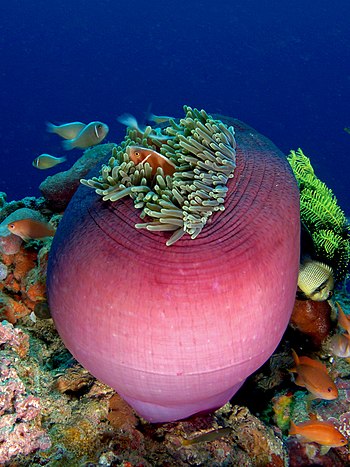
|
Heteractis magnifica, commonly known as the magnificent sea anemone, is a large species with a widespread distribution in the tropical and subtropical waters of the Indo-Pacific. The pink anemonefish, seen here among the sea anemone's tentacles, is one of a number of species of small fish which use it as a host, finding safety from predators among the stinging tentacles. Photograph credit: Nick Hobgood
Recently featured: |
May 21

|
Lucy Arbell (8 June 1878 – 21 May 1947) was a French mezzo-soprano whose operatic career was mainly centred in Paris and who was particularly associated with the composer Jules Massenet. She created the roles of Queen Amahelli in Massenet's opera Bacchus, inspired by Greek mythology, in which the gods appear in human form in ancient India to attempt to persuade the people away from the pervading Buddhist influence. This photograph, taken by the French photographer Nadar, depicts Arbell in the role of Queen Amahelli for the 1909 premiere of Bacchus at the Palais Garnier in Paris. Photograph credit: Nadar; restored by Adam Cuerden
Recently featured: |
May 22

|
|
This is a high-resolution topographic map of the surface of Mars, colored according to elevation, based on research led by Maria Zuber and David Smith on data collected by the Mars Orbiter Laser Altimeter, an instrument on board the NASA space probe Mars Global Surveyor. North is at the top of the main map, accompanied by two insets for the northern and southern polar regions. Highlands (red and orange) dominate the southern hemisphere of Mars, while lowlands (blue) predominate in the north – a feature known as the Martian dichotomy. Notable large surface features visible on the map include Olympus Mons (the highest mountain on Mars) and the volcanoes of Tharsis in the west, the Valles Marineris to the east of Tharsis, and the Hellas basin in the southern hemisphere. Map credit: NASA/JPL/USGS; edited by WolfmanSF
Recently featured: |
May 23

|
The eastern spinebill (Acanthorhynchus tenuirostris) is a species of honeyeater found in south-eastern Australia in forests, woodland and gardens. It is around 6 in (15 cm) long and has a distinctive black, white and chestnut plumage, a red eye and a long downcurved bill. It supplements its diet of nectar with small insects and other invertebrates. This male spinebill was photographed at the Mogo Campground, New South Wales. Photograph credit: John Harrison
Recently featured: |
May 24
| File unavailable |
Brigid Balfour (24 May 1914 – 1 March 1994) was a British scientist who studied cellular morphology and ultrastructure in relation to immune function. She advanced the study of dendritic cells, realising that they are derived from Langerhans cells and play an important role in initiating and promoting immune reactions. Photograph credit: National Institute for Medical Research; restored by Adam Cuerden
Recently featured: |
May 25

|
The Las Lajas Shrine is a Catholic minor basilica in Ipiales, Colombia, located within the canyon of the Guáitara River. The basilica was built between 1916 and 1949 in the Gothic architectural style to commemorate a apparition of the Virgin Mary. Measured from the base of the canyon, the basilica is 100 metres (330 ft) tall. Photograph credit: Diego Delso
Recently featured: |
May 26

|
A floating market is a market where goods are sold from boats. This photograph shows such a market in Banjarmasin, a city in South Kalimantan, Indonesia, in November 2016. The floating market is a reflection of the culture of the people of Banjarmasin and is a main attraction for tourists visiting South Kalimantan. Photograph credit: Muhammad Haris
Recently featured: |
May 27

|
Oldham's leaf turtle (Cyclemys oldhamii) is a species of turtle in the family Geoemydidae, found in Bangladesh, Myanmar, Thailand, Vietnam, and the Indonesian regions of West Borneo, Sumatra and Java. This turtle was photographed in Kaeng Krachan National Park, Thailand. Photograph credit: Rushenb
Recently featured: |
May 28

|
Anna Bilińska (1854–1893) was a Polish Realist painter. Born in Zlatopil, she moved to Paris to study at the Académie Julian. Bilińska is one of the first Polish female artists to receive professional artistic education and critical acclaim. Her paintings include A Negress and At the Seashore. This self-portrait of Bilińska, wearing an apron and holding a bundle of brushes, was painted in oil on canvas in 1887 and is now in the collection of the National Museum in Kraków. Painting credit: Anna Bilińska
Recently featured: |
May 29
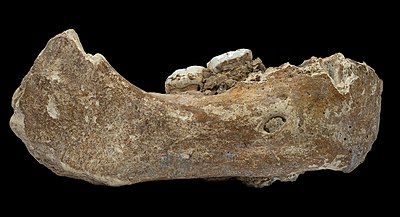
|
The Xiahe mandible is a hominin fossil jaw discovered in Baishiya Karst Cave, on the northeastern edge of the Tibetan Plateau in Xiahe County, Gansu, China. It was found in 1980 by a Buddhist monk who had entered the cave to meditate. This fossil discovery demonstrated that archaic hominins were present in a high-altitude, low-oxygen environment by around 160,000 years ago. Discover, Science News and Nova all named the discovery of the mandible in their lists of top science stories of 2019. Photograph credit: Dongju Zhang
Recently featured: |
May 30

|
In May 2021, water levels of Lake Oroville, a reservoir formed by the Oroville Dam in northern California, dropped significantly, exposing much of the lake's banks, as California headed into another drought year. Photograph credit: Frank Schulenburg
Recently featured: |
May 31
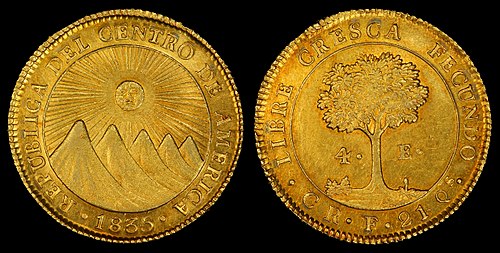
|
|
The Federal Republic of Central America was a sovereign state in existence from 1823 to 1841 in Central America that consisted of the territories of the former Captaincy General of Guatemala of New Spain. The republic consisted of the present-day countries of Costa Rica, El Salvador, Guatemala, Honduras, and Nicaragua, as well as the southern Mexican state of Chiapas. The republic's currency was the Central American Republic real; this photograph depicts the obverse and reverse of a four-escudo Central American Republic coin, minted in San José in 1835, and now in the National Numismatic Collection at the Smithsonian Institution. Coin design credit: Federal Republic of Central America; photographed by the National Numismatic Collection
Recently featured: |
Picture of the day archives and future dates
